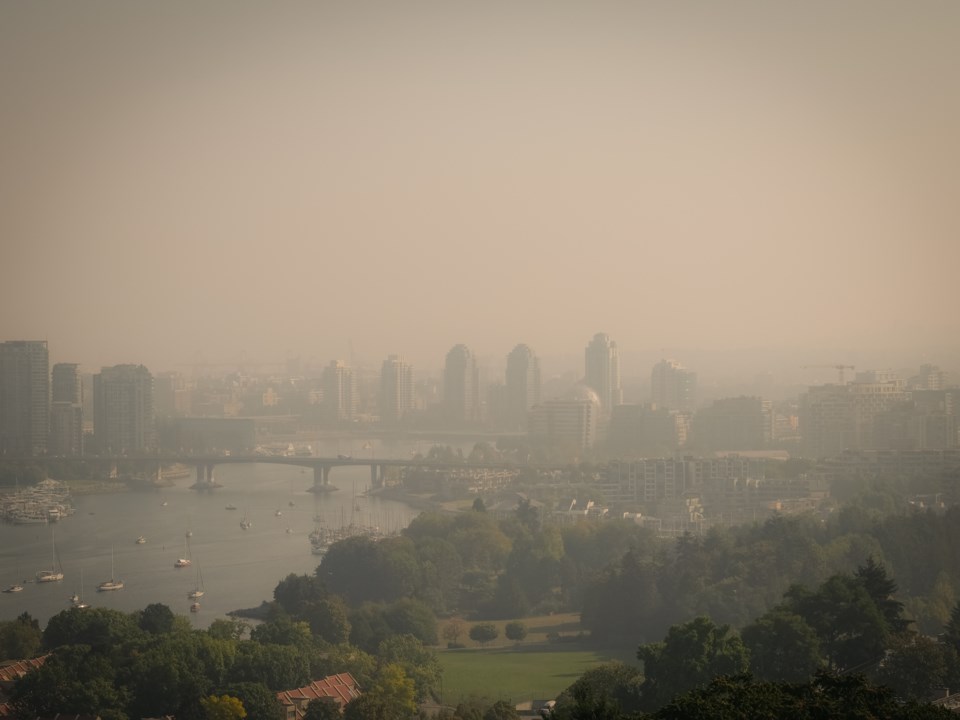The British Columbia Centre for Disease Control is warning British Columbians to prepare for what could be a wildfire smoke-filled summer.
While no alerts concerning smokey skies have been made yet for Metro Vancouver, the public health agency says it’s time to prepare all the same. The warning comes on the heels of the near-complete destruction of Lytton, a town in B.C.’s interior that was recently decimated by a still raging wildfire.
‘No reason to believe 2021 will be any different’
Sarah Henderson, scientific director of Environmental Health Services at the BCCDC says smoke has resulted from catastrophic wildfires that have occurred in western North America every year from 2016 to 2020.
“There is no reason to believe 2021 will be any different,” Henderson said. “Let’s start getting ready for the smoke now rather than waiting until it arrives.”
Prepare for #wildfire smoke: Stock up on medications especially for respiratory conditions like asthma, use a portable air cleaner with a HEPA air filter to keep indoor air clean, and use a well-fitted respirator or three-layer mask outdoors https://t.co/vqZ68Eel9D pic.twitter.com/sIZx8CUYIw
— BCCDC (@CDCofBC) July 3, 2021
In a recent notice, the BCCDC writes that wildfire smoke is made up of gases and fine particulate matter. These particles carry great risk to human health as they can be inhaled deep into the lungs and cause inflammation and irritation. Some of the other components of smoke can also irritate the eyes, nose, throat, and lungs.
“In 2017, 2018, and 2020, we experienced consecutive days and weeks of the worst air quality that most people will ever experience in British Columbia. We know that smoke really affects how people feel when it’s happening,” Henderson said. “There is growing evidence that exposure to seasonal wildfire smoke may have longer-lasting impacts on our health.”
Don’t throw away your face masks just yet
While the timing of wildfire smoke is mostly unpredictable, the BCCDC recommends taking the following measures before the smoke arrives:
- Be aware of people in your household who may be more sensitive and susceptible to wildfire smoke including those with chronic conditions like asthma, COPD, heart disease, or diabetes, pregnant people, infants and children, and older adults.
- For those who require rescue medications, especially for respiratory conditions like asthma, stock up to ensure you have supplies on hand for when the smoke arrives.
- Consider purchasing a portable air cleaner with a HEPA air filter to reduce particulate matter indoors.
- Use a well-fitted respirator or three-layer cloth or disposable mask outdoors. A good fit around the mouth and nose is the most important thing; inhaled air must pass through the material of the mask, not around it. Learn more about masks and wildfire smoke.
- People working outdoors should consult their occupational health and safety team about wildfire smoke protection.
- Learn about different tools you can use to monitor current air quality and wildfire smoke forecasts.
- During smoky times, keep your indoor air cleaner by closing your windows, recirculating air through a forced-air system, and using an air cleaner.
For more information about wildfire smoke and its impact on your health, you can check out the BCCDC’s webpage dedicated to the issue.



.png;w=120;h=80;mode=crop)